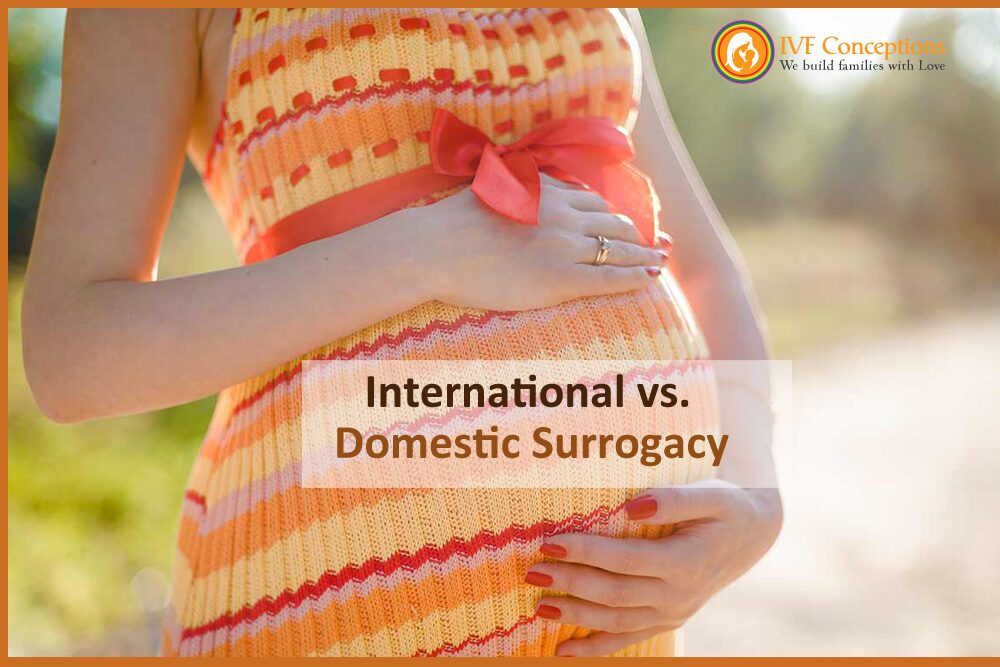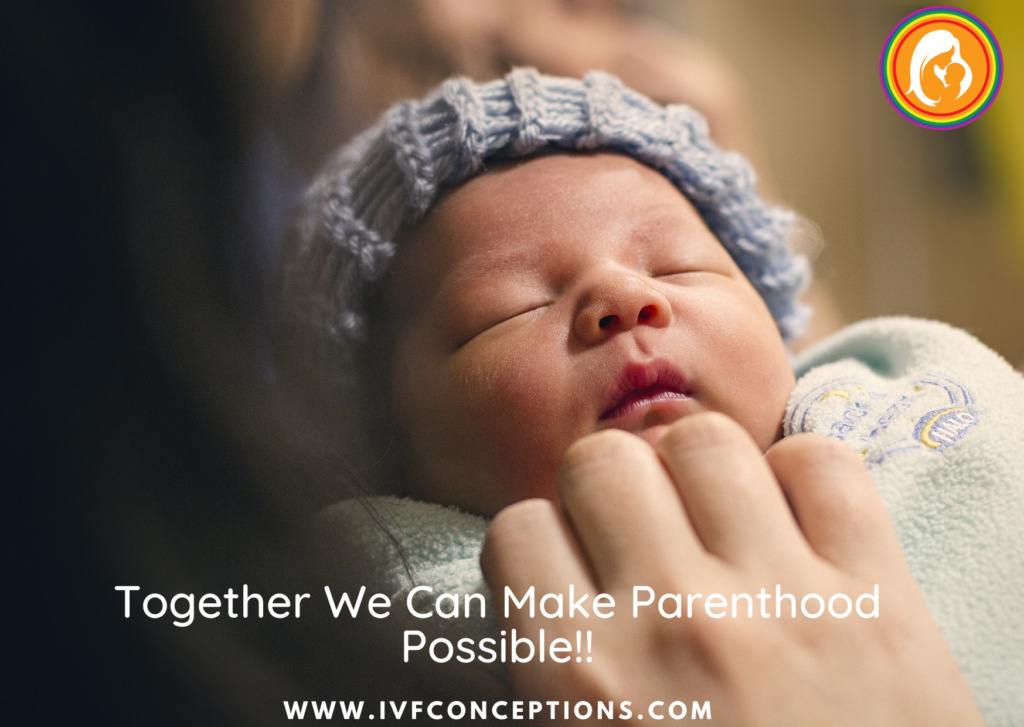Third-Party Reproduction: Comprehensive Guide to Assisted Family Building

“Third-party reproduction” is defined as reproduction assisted by using donated eggs, sperm, or embryos from a third person (donor) to help infertile individuals or couples to become parents.
This approach consists of various assisted reproductive technology (ART) procedures, including IUI and IVF, as well as surrogacy arrangements. In this comprehensive guide, we delve into the intricate world of third-party reproduction, covering egg donation, sperm donation, embryo donation, and surrogacy options.
As a pioneering fertility and surrogacy consulting service, IVF Conceptions is committed to guiding you through this transformative experience, ensuring your aspirations are met with compassion, expertise, and cutting-edge medical techniques.
In this process, individuals or couples utilize donated eggs, sperm, or embryos from generous donors to realize their dream of parenthood. Moreover, our commitment extends to gestational surrogacy, wherein a compassionate surrogate carries the pregnancy, opening avenues for intended parents within legal frameworks.
Get in touch for FREE SURROGACY CONSULTING:
Mobile: +91-8800481100 ( WhatsApp, Line, Viber)
Email: neelam@ivfconceptions.com

Understanding Third-Party Reproduction
The concept of third-party reproduction has played a significant role in the lives of infertile couples or single would-be parents to grow their families. With latest reproduction techniques and wide acceptance of egg donors, sperm donors, and surrogate mothers made it a successful avenue for many childless couples.
Third-party reproduction involves a unique collaborative process, wherein a generous woman ( known as a surrogate mother or gestational carrier) willingly carries and later relinquishes a child for the benefit of individuals or couples who aspire to raise a child.
Through therapeutic donor insemination or advanced assisted reproductive technologies such as in vitro fertilization and embryo transfer, third-party reproduction offers hope to those grappling with fertility challenges.
More resources:
Gestational surrogacy pros and cons
Legal requirements for surrogacy

What are Third-Party Reproduction Options for Intended Parents
Egg Donation
Choosing an egg donor is an important part of egg donor IVF. Egg donation plays a vital role in assisting women who face challenges with conception. IVF Conceptions offers both known and anonymous egg donation options. Known egg donation involves a family member or friend acting as the donor, while anonymous egg donation keeps the donor’s identity confidential.
Our thorough screening process ensures the highest quality donor selection, adhering to guidelines set by the American Society of Reproductive Medicine (ASRM) and FDA regulations.
Sperm Donation
For men who wish to contribute to the journey of parenthood, sperm donation offers an opportunity to help others conceive through IUI or IVF.
At IVF Conceptions, we provide access to accredited sperm banks, assuring the quality and safety of donated sperm. Directed (known) sperm donation is also available, allowing individuals or couples to choose a family member or friend as the donor.
Embryo Donation
Unused embryos from IVF cycles present a unique chance to help others experience the joy of pregnancy and childbirth. Embryo donation involves using embryos from previous cycles to conceive.
Surrogacy (Gestational Surrogacy)
Surrogacy provides an avenue for women or couples unable to carry a pregnancy themselves. Gestational surrogacy, the most common form, involves transferring an embryo created through IVF into the surrogate’s uterus.
Traditional surrogacy, where the surrogate contributes genetically to the pregnancy, is not offered at IVF Conceptions.
More resources for gay surrogacy:
Surrogacy options for same-sex couples
Affordable gay surrogacy destinations
LGBT-friendly surrogacy agencies

Ethical Challenges and Considerations
While third-party reproduction offers a good opportunity for infertile couples, it also presents multifaceted ethical challenges that demand thoughtful consideration.
As advocates of responsible reproductive practices, IVF Conceptions acknowledges concerns about the voluntariness of gestational carriers’ participation, the potential psychosocial impacts on all involved parties, and the commodification of human gametes and children.
We understand that addressing these concerns requires an unwavering commitment to ethical guidelines.
Our approach is rooted in transparency, empathy, and individual autonomy. To ensure ethical practice, we adhere to the following principles when caring for patients:
- Patient-Physician Relationship: We establish patient-physician relationships with only one party involved, mitigating conflicts of interest and preserving the integrity of the process.
- Comprehensive Screening: We prioritize the well-being of all parties by conducting thorough medical and psychological assessments, ensuring that everyone involved is fully prepared for the journey ahead.
- Informed Decision-Making: We empower patients by providing them with comprehensive information about the risks, potential psychological impacts, and implications for relationships.
- Freedom from Pressure: We diligently ascertain that every individual’s decision to participate in third-party reproduction is devoid of coercion, respecting their autonomy and choices.

Why Choose Third-Party Reproduction
At IVF Conceptions understand that the decision to embark on a third-party reproduction journey is not easy. Egg donation Surrogacy is sometimes the only hope for infertile couples who have gone through lots of struggles with years of infertility treatments.
Evening spending thousands of dollars on costly infertility treatments like IVF, these couples still find themselves unable to have babies due to multiple reasons.
For example, for women who are in a higher age group or have low AMH values, egg donation gives hope to having a baby of their own.
Why Choose Egg Donation?
The reasons for using egg donors are:
- Absent or poorly developed ovaries
- Premature ovarian failure
- Risk of genetic disease transmission.
- Low AMH values
Likewise, individuals or couples who face male infertility challenges can find a solution in sperm donation, especially in cases of azoospermia or low sperm count.
Why Choose Surrogacy?
Reason for using a surrogate mother:
Surrogacy offers a path to parenthood for those facing unique challenges. Here’s why it’s considered:
- Overcoming Obstacles: Surrogacy helps individuals and couples overcome fertility issues, providing hope and a chance to have a child.
- Medical Considerations: For women with conditions like absent ovaries, surrogacy offers a way to experience motherhood.
- Genetic Disease Prevention: Couples with genetic concerns can ensure a healthier start for their child through surrogacy.
- Age and Infertility: Surrogacy provides a solution for advanced age or male infertility.
- Complex Medical Situations: Surrogacy is a safe option for complex medical scenarios.
- Shared Parenthood: Intended parents can actively participate in the pregnancy journey.
- Customized Family Building: Surrogacy allows for flexible family building.
- Supportive Process: Expert guidance ensures a safe and supported journey.

Third-party reproduction process
Embarking on the Path: We believe in meticulous planning and a comprehensive approach to have a successful third-party reproduction experience.
Our collaboration begins with sourcing donors from renowned ART banks and agencies. These donors are thoughtfully matched based on various criteria, ensuring compatibility in terms of education, background, physical attributes, and even blood grouping.
Before recruitment, potential donors undergo thorough physical assessments, including screening for infectious diseases and genetic profiles.
The Role of Technology: Our commitment to your journey is reflected in the technology-driven procedures we employ.
In egg donation scenarios, the stimulation of donors with injections is synchronized with the preparation of the recipient’s uterus for seamless embryo transfer.
Meanwhile, sperm samples undergo a rigorous quarantine period and are screened for various infectious agents, ensuring the utmost safety.
The Surrogacy Options: We have more than 13 years of experience in assisting with affordable surrogacy options globally. We offer domestic and international surrogacy processes which are affordable and within the legal framework.
Whether utilizing your own eggs, donor eggs, frozen embryos, or a combination thereof, our team ensures that your journey is supported by advanced medical techniques, while offering emotional support every step of the way.
What You Need to Expect During Third-Party Reproduction Parenting
The third-party reproduction parenting journey demands patience and meticulous planning. Finding the perfect donor or surrogate requires time, aligning preferences and expectations.
Once the ideal match is identified, both parties formalize the arrangement through a comprehensive contract, covering all pertinent aspects including finances.
Expect the unexpected: Like in any mother’s medical procedure, there are times when things will not go as per the plan. The uncertainty of the outcome of IVF cycles, performance of egg donor, and rate of fertilization are some.
The success rate of IVF cycles and the number of embryo transfers needed can not be predicted in advance.
Besides this, the chances of having an abortion or any medical complication during or after the pregnancy are possible.
Trust your team: Once you have chosen your surrogacy agency or surrogacy agents, follow the lead and trust them as it is teamwork. They are experts in this field and might have years of experience to guide and assist you with the best path for you. The mutual goal is to have a healthy baby and it takes time and patience.

Addressing Risks Associated with Third-Party Parenting
While the journey of third-party reproduction is characterized by hope and advancement, we acknowledge the importance of minimizing risks.
Our approach entails personalized strategies, such as transferring only one embryo at a time, using an experienced egg donor and surrogate mother. We guide you through every step, ensuring a well-informed decision-making process.
Read more:
Top 4 cheapest countries for surrogacy
Best Countries for Surrogacy 2023- Top International Destinations
Risks of international surrogacy
Global International Surrogacy Options
IVF Conceptions Surrogacy Prices & Plans ( in 2023)
Countries such as Mexico, Colombia, Argentina, and Guatemala are rapidly gaining popularity as viable alternatives. These countries offer the advantage of lower surrogacy costs without compromising on legal assurances, providing a balanced and reliable solution for those seeking low-cost family-building options.
| Country | Regulation & Organization | Suitability for Single Parents & Same-Sex Couples | Surrogacy Cost | Legal Assurance |
| USA | Highly regulated and organized | Favorable | Higher cost $150,000 to $200,000 | Strong |
| Colombia | Altruistic | Suitable | Affordable $70,000 | Reliable |
| Mexico | Altruistic | Suitable | Affordable $70,000 | Reliable |
| Argentina | Altruistic | Suitable | Affordable $80,000 | Reliable |
| Guatemala | Altruistic | Suitable | Affordable $60,000 | Reliable |
Conclusion
In summary, third-party reproduction represents a fantastic way of creating families for those who suffer years of infertility struggles and are unable to have a baby of their own.
At IVF Conceptions, we approach each surrogacy journey with the utmost care, consideration, and passion for both intended parents and surrogate mothers.
Get in touch for FREE SURROGACY CONSULTING:
Mobile: +91-8800481100 ( WhatsApp, Line, Viber)
Email: neelam@ivfconceptions.com

FAQs about the Third-Party Reproduction:
What is third-party reproduction?
Third-party reproduction involves utilizing donated eggs, sperm, or embryos to help infertile couples become parents. It may also include gestational surrogacy where someone else carries the pregnancy for intended parents.
How does egg donation work in third-party reproduction?
Egg donation entails a donor providing eggs, which are fertilized with sperm to create embryos. These embryos are then transferred to the recipient’s uterus for pregnancy.
What are the legal considerations in surrogate motherhood?
Surrogate motherhood involves legal agreements defining the rights and responsibilities of all parties involved, ensuring a smooth process and a secure future for the child.
What is the role of a sperm donor in third-party reproduction?
Sperm donors contribute genetic material that, when combined with eggs, leads to embryo development for implantation in the recipient’s uterus.
Are there risks associated with third-party reproduction?
While generally safe, risks can include multiple pregnancies, medical complications, or emotional challenges for all parties involved.
How do intended parents choose a surrogate or donor?
Intended parents often consider medical and personal characteristics, matching values and preferences, through agencies or clinics.
What are the emotional aspects of third-party reproduction?
Emotional aspects can be complex, involving feelings of gratitude, attachment, and navigating relationships with donors or surrogates.
What is the success rate of in vitro fertilization (IVF) in these cases?
Success rates vary, influenced by factors like age and health. IVF techniques have improved outcomes, though results are not guaranteed.
How are medical and genetic backgrounds assessed in donors?
Donors undergo thorough medical and genetic screenings to ensure compatibility, and health, and minimize potential risks.
What are the ethical concerns in third-party reproduction?
Ethical concerns encompass consent, transparency, and ensuring the well-being of all parties, especially the child born from these arrangements.

